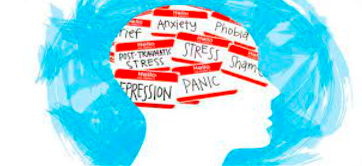Navigating Mental Health Challenges: A Journey of Healing and Hope

It is crucial to recognize and tackle mental health issues affecting individuals of all ages, genders, and professions, which may stem from workplace stress, academic pressure, or personal challenges.
One of the primary hurdles individuals with mental health issues encounter is the stigma and discrimination associated with these conditions. This stigma often leads to feelings of isolation, shame, and reluctance to seek help.
Many people feel ashamed or embarrassed to seek help, leading to a reluctance to address their issues. This stigma can be particularly harmful in the workplace, where employees may fear that seeking mental health support will negatively impact their career prospects. These challenges can manifest in various forms.
Mental health challenges in the workplace:

Workplace stress can significantly impact an individual’s mental well-being. Long hours, high-pressure environments, and an unhealthy work-life balance can contribute to feelings of anxiety, depression, and burnout. Employers and colleagues should understand these challenges and provide support and resources to help employees handle stress and protect their mental well-being.
Encouraging open communication in the workplace to create a positive culture, empathy, and understanding of mental health challenges is essential. By addressing workplace stress and raising mental health awareness, individuals can better manage their health and overall well-being mental health issues among students:
Mental health issues among students have become a significant concern in recent years. Dealing with school can be challenging for students. Sometimes, they might feel stressed or anxious, and other times, they may struggle with more severe issues like feeling down or having problems with eating. The demands of schoolwork, social expectations, and personal relationships can all lead to the development of mental health issues in students.
Creating a supportive environment in educational institutions is also essential. This includes open communication, promoting empathy and understanding, and encouraging students to seek help whenever needed. When students, educators, and mental health professionals work together, they can create a community that effectively supports students’ mental health needs.
Living with Mental Illness:
Living with mental illness can be challenging and overwhelming for individuals. It often involves dealing with symptoms such as anxiety, depression, mood swings, and cognitive impairments. These symptoms can impact daily life, relationships, and overall well-being. People with mental illness often face stigma and discrimination, which can make it hard for them to get the help and support they need.
Self-care is crucial for managing mental health challenges. It involves taking proactive steps to maintain one’s physical and emotional well-being. These activities include exercising, eating healthily, getting enough sleep, and participating in hobbies or activities that bring joy and relaxation.
Getting professional help, like therapy and medication, is essential for managing mental health challenges. Mental health professionals can give advice, support, and tools to help people deal with their symptoms and improve their overall quality of life.
Mental Health Empowerment:
Empomental health is crucial for improving overall well-being and helping people with mental health challenges. Assisting individuals in taking charge of their mental well-being necessitates furnishing them with the essential tools, resources, and assistance to enable informed decision-making. This encompasses facilitating access to mental health professionals, educational materials, and self-care methodologies.
Empowerment means establishing a supportive environment where individuals feel confident discussing mental health and getting the help they need. This can be achieved through open communication, empathetic support from friends, family, and colleagues, and implementing policies and programs that prioritize mental health in the workplace and educational institutions.
Ultimately, mental health empowerment is about giving individuals the power to manage their health and well-being, reducing stigma, and fostering a culture of care and understanding. Promoting mental health challenges can help individuals overcome, face, and lead happier, healthier lives.
The Journey to Hope, Health, and Healing
Overcoming mental health challenges necessitates the amalgamation of self-care practices, professional assistance, and empowerment. To take care of yourself, make sure to do activities that help you relax, such as exercise, meditation, and hobbies. Seeking professional aid, such as therapy or counseling, can furnish valuable guidance and support in effectively managing mental health challenges. Empowerment stems from acknowledging personal strengths, establishing attainable objectives, and cultivating coping mechanisms to handle stress and anxiety adeptly.
The fragmented nature of mental health services can pose challenges in accessing the support needed. This highlights the importance of promoting education and mental health to help individuals navigate the system more effectively. By addressing these aspects, we can strive to create a more inclusive and empathetic society that cherishes and uplifts the mental well-being of all individuals.
Conclusion
“It’s essential to recognize mental health issues early and reach out for professional help when you need it.” It’s imperative to spread awareness and understanding about mental health issues. This helps reduce stigma and encourages open and supportive conversations about mental health. Let’s build a community that values and supports cognitive health and well-being.




